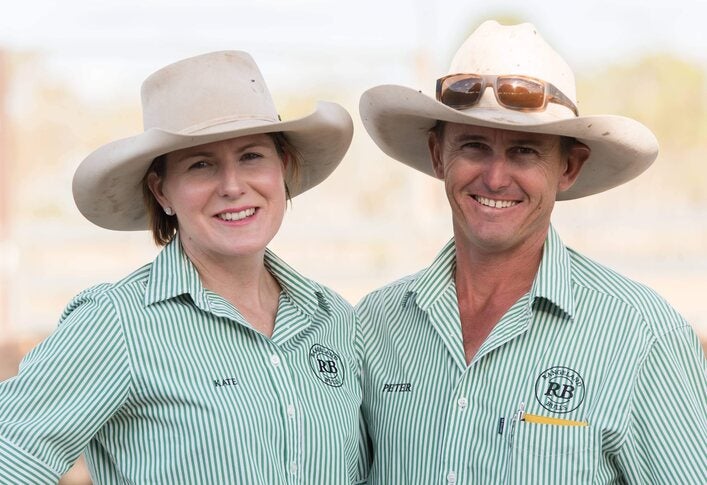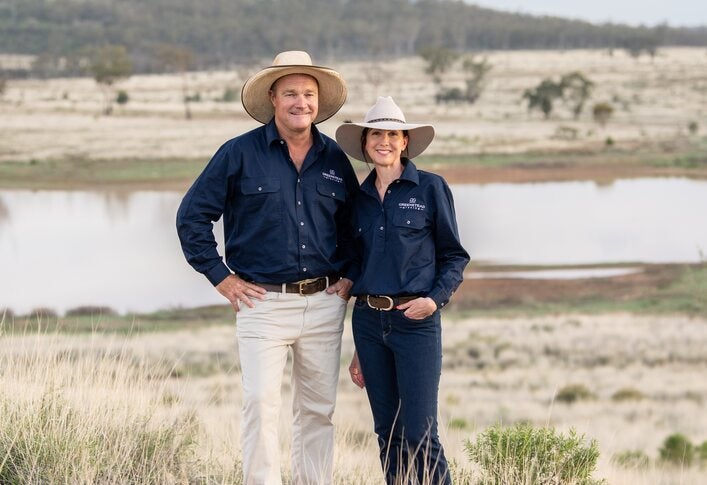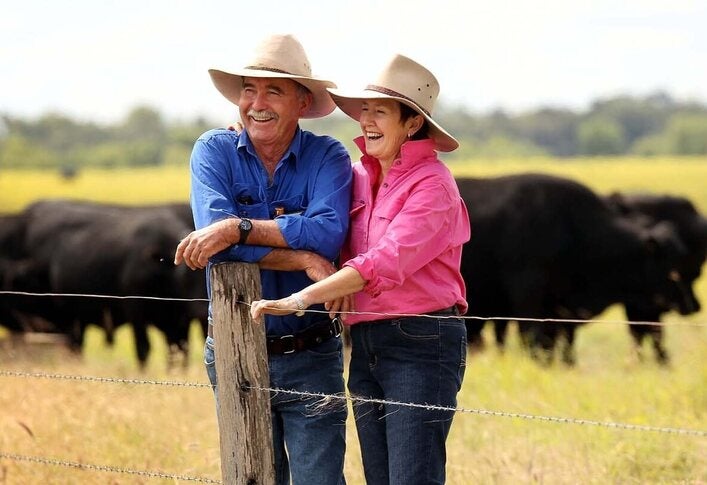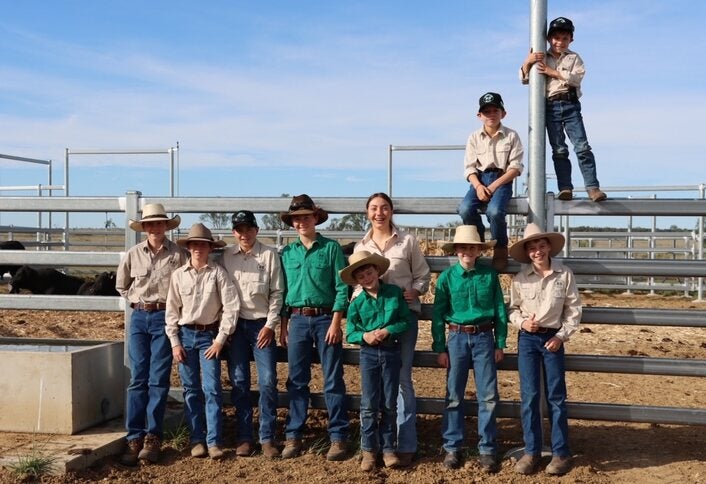Posted by on
11/08/2023
Kate and Peter Moloney
Over two decades of highly considered breeding underpin Queensland organic cattle operation, Rangeland Bulls – yet for the extended Taylor family, their cattle represent something far greater.
Rangeland Bulls is a genuine labour of love, representing purpose, legacy, vision and the shared bond within the family.
Established by Steve and Esmae Taylor, together with their daughters and sons-in-law Kenton and Amy Peart and Kate and Peter Moloney, 26 years ago, Rangeland Bulls leverages south west Queensland’s unique natural grass capital to produce fully organic, paddock raised, and adaptable commercial seedstock.
And while all three families operate as separate businesses – Steve and Esmae at “Moriah” Chinchilla, Kenton and Amy at “Dunvegan” Charleville, and Kate and Peter on the original home block “Wetlands” Augathella, they each stringently adhere to the Rangeland Bulls breeding program, culminating in the annual Rangeland Bulls sale each September.
A Business in Perspective
Kate explains that Rangeland Bulls’ unique family collective structure would never have been possible if not for the generosity and vision of her parents, Steve and Esmae.
“When it came to succession planning mum and dad were very proactive. We explored a number of alternatives such as profit sharing and leasing, but at the end of the day the option that suited us best for the long term was for each entity to have independence,” she explains.
“Dad is a firm believer that if you don’t have a good crack in your 30s, you’re foregoing some of your most productive years, and he didn’t want to run the farm from the grave, so they very generously sold the majority of their land to us at less than market value, including cattle and plant.”
Steve and Esmae subdivided the family property into two, based on carrying capacity, which we all agreed represented an equal split. “We actually flipped a coin to choose our blocks,” Kate laughs. “And we were all very satisfied with the fairness of the outcome.”
It was a simple solution to a complex issue, but Kate concedes that they took into account all factors, including death and divorce, during the planning stages – the process eased thanks to open communication channels and clear timelines.
“I see friends going through harrowing succession planning, and families torn apart, which is devastating – we are thankful that the process for us was exciting and positive and gave our family a pathway to operate into the future.”
This is a family, however, who hold a unique perspective on relationships and succession.
Over 20 years ago this tight-knit family suffered tragedy at its worst, losing their 19-year-old son and brother, Lawson, to a freak lightning strike on farm.
“When it came to succession, my parents’ weren’t motivated by money – their value is in family and the reward of seeing your life’s work continued with the next generation.”
“They would have been miles ahead financially keeping the place, but it would have locked us out forever. We certainly acknowledge the trust they have placed in us which enables our families to live this unique lifestyle we’re so passionate about.”
The Power is in the Program
Rangeland Bulls breeding program began 26 years ago when Steve and Esmae were building their cattle business from humble beginnings.
Light breeder country with nutritional constraints and the need to keep cost of production down meant they looked to genetics to help them improve fertility and transition to yearling mating to drive profitability.

Kenton and Amy Peart
Since then, the family has maintained a disciplined breeding program, with a strong focus on productivity gains that come from running fertile, efficient cows that will wean a higher percent of their own weight, with fewer inputs.
The breeding program continues to be focused squarely on commercial values with the enduring goal of optimising net profit per hectare in a commercial environment.
Rangeland Bulls are Angus Brahman composite – three quarters Angus and one quarter Brahman, polled and selected for adaptation to the environment and commercial productivity, whilst achieving optimum market compliance.
Herd Fertility is Number One
Rangeland Bulls breeding program has a strong focus on fertility, as it is known to have the greatest impact on bottom line performance.
Selection pressure across the herd means every female must calve unassisted by two years of age, and continue to wean a calf every 12 months, within a 60-day joining.
Cows need to work hard to stay in this grass-fed organic system, Kate explains, and it’s this selection pressure that is essential for the genuine genetic progress of the herd and compounding herd fertility.
“Yearling joining is particularly important to us and has been the single biggest profit driver we’ve implemented,” Kate said.
This long term continued selection pressure has meant the herd has evolved to moderate frame size cows, reducing resources required for body maintenance, which find it easier to maintain condition and reconceive within a 12 month interval.
Grass Fed, No Inputs
The herd is grass-fed and certified organic, free of any artificial inputs.
“Regardless of the organic premiums, this is how we would choose to run our cattle. The system is very efficient and sustainable. Our country in south west Queensland is well suited to organic grazing, and low inputs keep our cost of production down.”
A commercial breeder herd of 4,800 females are run on the family’s properties around Morven, Augathella, Charleville, Mitchell and Chinchilla, and Kate said their cattle were bred in tough environmental conditions, and as such, were highly adaptable and could perform off grass, with no artificial inputs.
Bull Selection – Making the Grade
The family’s priority has never been to produce a large number of bulls, rather, selecting animals they wish to use themselves.
“We adhere to a very strict bull selection criteria, with only the top five percent of male calves selected as bulls for continued genetic gain.”
Early puberty is a key breeding goal.
“We measure and select for scrotal size at weaning, and at one year old they must have a scrotal measure of 28cm plus off grass,” Kate explains.
Kate said bulls are deliberately assessed at their poorest – they’re weaned in March and measured in June, they’re off milk and the feed is frosted, so it really ensures their genetic merit is measured with full transparency.
"As commercial cattle breeders, the bulls that display adaption, constitution and do-ability in the paddock, without inputs, are the ones we want to breed steers from."
“We are entirely invested in the direction of the breeding program as these are the bulls we use in our own commercial beef operation.”
Temperament is another key selection criteria for Rangeland Bulls. Stock are worked using low stress stock handling methods and all animals, cows and bulls, are assessed on temperament and culled if they don’t make the grade.
After 26 years of this highly disciplined program, Rangeland Bulls boast a consistent, even type.
“We’ve set the parameters and follow them year after year, if our cattle can’t meet this, they essentially take themselves out.”
15th Annual Rangeland Bulls Sale
With the 15th annual Rangeland Bull sale to be held on 27 September on property and online at “Glenba” Morven, the family is busily preparing for one of the highlights on their calendar.
“We enjoy the day and we enjoy meeting with other commercial beef producers. In the early days we took a very low-key approach to selling our bulls – we’d send out an email and didn’t want to be too much in people’s faces, but interest in the bulls really spoke for itself.”
“People like the fact Rangeland Bulls are genuinely grass-fed and straight out of the paddock, they appreciate the lack of artificial inputs and that there has been zero sale preparation – there’s no grain or oats in our system, and many of our bulls go to far better country and do exceptionally well.”
“When you buy a bull, you’re essentially buying a program, and we’ve found our clients really understand this – they want to come for a drive around our paddocks and see the cows, they value the legacy of function in these cows.”
As interest in the sale has grown, so too has the yarding of bulls.

Steve and Esmae Taylor
“This year will be our largest yet with over 100 bulls being offered and we hope this provides clients with some more options and the opportunity to acquire the type of animals that best suit their requirements,” Kate explains.
“Our focus remains squarely on the commercial values of the program and we hope any bulls they purchase bring value to their business like they do to ours.”
An inter-generational partnership
With Rabobank supporting the business since 2008, when family succession was put in place, Kate said the Rabobank All In One product was well aligned with the needs of their rural business.
“Its structure gives us the flexibility we need and is extremely convenient to use, likewise the depth of specialist industry knowledge within Rabobank has also proved valuable.”
“Lee White, Roma Branch, is our current manager and has become an integral part of what we do, and we value this long term relationship.”
“Lee understands our business and has supported the direction we want to go as our operation continues to evolve and grow.”
“The Rangeland Bulls team greatly appreciate the wonderful support of Rabobank in sponsoring our annual bull sale every year since 2015, and it’s this additional and unique level of support that underpins our long term partnership.”
“We enjoy working with Lee and the Roma team and look forward to welcoming them to our sale – their presence and support come sale day is further testament to Rabobank’s dedication to our business.”

